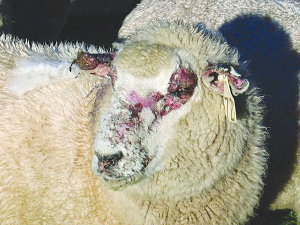Perfect conditions for fly and FE
Warm wet weather in many areas of the country creates the perfect conditions for the production-limiting diseases flystrike and facial eczema (FE).
 FE causes damage to the bile system of the liver of the animal which can reduce a ewe’s lifetime productivity by 25%. A secondary effect is photosensitisation, which causes skin reddening and peeling, leaving affected area susceptible to other infections.
FE causes damage to the bile system of the liver of the animal which can reduce a ewe’s lifetime productivity by 25%. A secondary effect is photosensitisation, which causes skin reddening and peeling, leaving affected area susceptible to other infections.
A pilot study investigating the potential of a facial eczema (FE) tolerance test is being launched this month.
The purpose of this pilot study, which is being led by AgResearch’s Dr Axel Heiser and funded by Beef + Lamb New Zealand (B+LNZ), is to test the feasibility of a laboratory-based test to determine an animal’s tolerance to the toxin associated with FE.
If initial results look promising, the test will require further development and full validation to make it a readily available test for breeders and commercial farmers.
FE has been around in New Zealand for over 100 years.
The cause of the disease is attributed to the toxin sporidesmin, produced by the fungus Pithomyces chartarum. This spore-producing fungus sits in the litter at the base of pasture swards.
Sporidesmin causes damage to the bile system of the liver of the animal which can reduce a ewe’s lifetime productivity by 25%. A secondary effect of the liver damage is photosensitisation, which causes skin reddening and peeling, leaving affected area susceptible to other infections. It is suspected that for every clinical case of FE there are 10 more with the disease.
This disease causes significant production losses and impacts on the welfare of affected animals. It has been estimated that in a bad year, FE can cost the country $266 million in lost production.
More common in warm, moist environments, a changing climate means FE is likely to spread further into southern regions over time.
Most research into FE is historical and limited management tools are available. This is despite the significance of FE and the length of time it has been affecting livestock in NZ.
“This (latest) work is a great example of B+LNZ investing in research now to find solutions to a problem that farmers face now and that will become worse over time” says Dan Brier, B+LNZ’s general manager farming excellence.
The pilot study gets underway this month and results are expected by March 2021. If the pilot is successful – and funding can be secured – validation and implementation of the test is expected to be completed by late 2022.
Heiser says that with new science approaches and technologies, there is an opportunity to find a solution to this serious issue for New Zealand farmers.
Alongside this proof-of-concept work, B+LNZ will be working with Heiser to build a collaborative funding bid to for a larger research programme to investigate the knowledge gaps of FE in New Zealand.
This programme aims to provide several new strategies to reduce the occurrence and impact of FE for farmers.
• For more information about Facial Eczema go to: https://beeflambnz.com/knowledge-hub/PDF/facing-facial-eczema
The World Wide Sires National All Day Breeds Best Youth Camp Best All Rounder plaudit has become family affair, with 2026 Paramount Cup winner Holly Williams following in her sister Zara's footsteps.
DairyNZ is giving New Zealand farmers a unique opportunity to gain hands-on governance and leadership experience within the dairy sector.
Herd improvement company LIC has posted a 5.2% lift in half-year revenue, thanks to increasing demand for genetics.
According to the latest Fresh Produce Trend Report from United Fresh, 2026 will be a year where fruit and vegetables are shaped by cost pressures, rapid digital adoption, and a renewed focus on wellbeing at home.
The Roar is a highlight of the game hunting calendar in New Zealand, with thousands of hunters set to head for the hills to hunt male stags during March and April.
OPINION: The past few weeks have been tough on farms across the North Island: floods and storms have caused damage and disruption to families and businesses.

OPINION: Meanwhile, red blooded Northland politician Matua Shane Jones has provided one of the most telling quotes of the year…
OPINION: This old mutt has been around for a few years now and it seems these ‘once in 100-year’ weather…